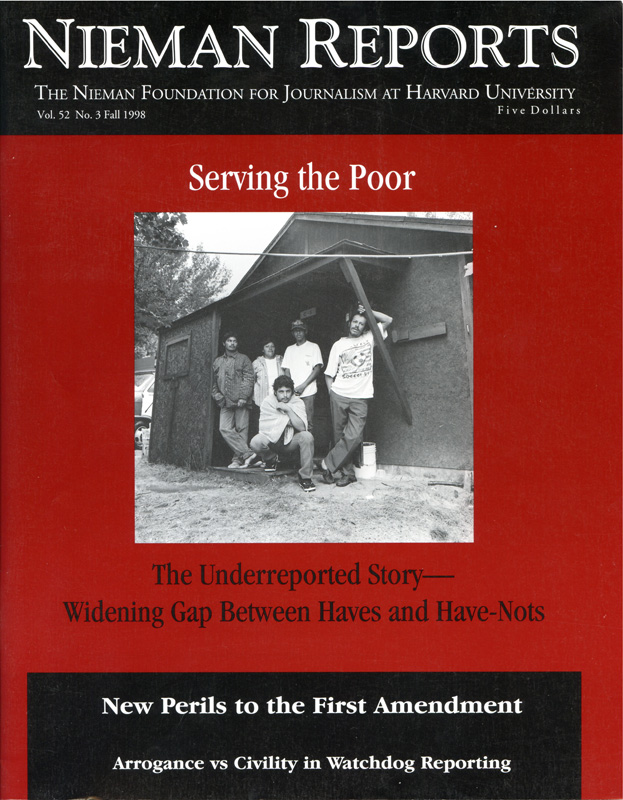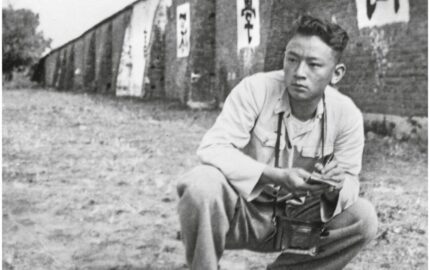After years of self-satisfied isolation, Indonesia finds itself exposed on the world’s financial pages and, occasionally, on front pages. The last time journalists paid so much attention to this immense, complex and fascinating country was 30 years ago when blood was running in the streets while the military overturned the communist-tinged regime of Sukarno. (Many Indonesians get along just fine with one name.)
The Suharto government that has been running Indonesia for the intervening three decades has, to its credit, permitted foreign journalists to enter the country and cover its economic crisis. It did not allow such access previously. Few foreign journalists are based in Jakarta because of the government’s attitude and because of editors’ general lack of interest in the region. Local journalists operate under debilitating official restraints and self-censorship, but they are notable for their courage in pushing the limits and for producing good reporting.
For the outsider, however, Indonesia is nearly an insoluble mystery. The country spreads over 17,000 islands in an east-west belt as wide as the continental USA. There are well over 200 million people of dozens of ethnic and linguistic groups. The fact that it has held together as a single state for nearly 50 years is a geopolitical miracle.
There are good histories of the country, including “Indonesian Upheaval,” the eyewitness record of the Sukarno downfall by John Hughes (Nieman Fellow 1962) and the more recent “Shared Hopes, Separate Fears” by Paul F. Gardner, a record of 50 years of U.S. relations with the country. Still, for the journalist seeking deep insights into Indonesia and the Javanese who dominate its politics there is nothing better than the “Buru Quartet,” a four-volume epic by the country’s finest novelist, Pramoedya Ananta Toer.
Pramoedya, ill and aged, lives under official surveillance in Jakarta because the military officers that dominate the government discovered an unforgivable taint of “Marxist- Leninism” in his work. The fact that Sukarno also found him dangerous, locked him away without trial for 14 years and had his library and archives burned, made no difference. There was a brief interim when Pramoedya was allowed to write and publish, but in 1981 his books were banned and he was confined to his house.
The work was so subversive that the author’s translator, Max Lane, an Australian diplomat, was expelled from Indonesia. Students who invited the author to speak were expelled from their university and his publisher was put in jail. Still, the entire work has been translated and was recently issued in colorful Penguin paperbacks.
“Denied access to writing materials, [Pramoedya] kept his literary vision alive by recounting his stories to other prisoners,” Lane recalled.
The central story focuses on a single character, Minke, who lives an exotic life that concludes with his taking a lead in the battle against the colonial rulers in the Netherlands. Across the pages there is a parade of characters that could be found only in Indonesia—Dutch-educated Javanese, like the hero; mixed blood locals; Javanese nationalists, who still dominate the country; Dutch police and military administrators; Chinese and Japanese merchants and traders.
Correspondents get a whiff of this exoticism during their visits to Indonesia, but these novels bring it to life as no encyclopedia, history or other reference book can. The impact is the same as reading Nadine Gordimer about South Africa, Alexander Solzhenitsyn about the Soviet Union, Gabriel Garcia Marquez about Latin America; Wole Soyinka about Nigeria; Heinrich Boell about Germany, and William Faulkner about the American South.
Clever journalists have long read fiction as a way of improving their use of the language and for getting ideas for that one big novel that might put them on Easy Street, á la Joe Klein. But good novels are also great sources for insight into lands that Americans do not often visit for lack of interest or because of official barriers. Novelists are unusually perceptive and articulate eye witnesses and, therefore, dangerous to autocratic regimes. Gordimer 35 years ago described South Africa as a place where “the gap between the committed and the indifferent is a Sahara whose faint trails, followed by the mind’s eye only, fade out in the sand.”
In the quietly-published, new “Invisible Allies,” Solzhenitsyn put on paper his gratitude to a secret host of men and women who for years helped him to preserve and distribute his manuscripts when the Kremlin saw him as one of its most dangerous enemies. There are names here that old Kremlin watchers will recognize, but many more that even the best informed were never aware of and could not be disclosed until communism was buried. There is a haunting echo of the recent past in this book.
Novelists speak a truth and display a courage that few journalists can match. Such writers challenge the myths created by dictators of all kinds, hence Solzhenitsyn was sent into exile; Gordimer’s books were banned by the old regime and Soyinka lives in danger, labeled “traitor” by the generals and colonels who run Nigeria. Any wonder why they won Nobel Prizes?
Murray Seeger, a 1962 Nieman Fellow, teaches journalism at George Washington University.
The Suharto government that has been running Indonesia for the intervening three decades has, to its credit, permitted foreign journalists to enter the country and cover its economic crisis. It did not allow such access previously. Few foreign journalists are based in Jakarta because of the government’s attitude and because of editors’ general lack of interest in the region. Local journalists operate under debilitating official restraints and self-censorship, but they are notable for their courage in pushing the limits and for producing good reporting.
For the outsider, however, Indonesia is nearly an insoluble mystery. The country spreads over 17,000 islands in an east-west belt as wide as the continental USA. There are well over 200 million people of dozens of ethnic and linguistic groups. The fact that it has held together as a single state for nearly 50 years is a geopolitical miracle.
There are good histories of the country, including “Indonesian Upheaval,” the eyewitness record of the Sukarno downfall by John Hughes (Nieman Fellow 1962) and the more recent “Shared Hopes, Separate Fears” by Paul F. Gardner, a record of 50 years of U.S. relations with the country. Still, for the journalist seeking deep insights into Indonesia and the Javanese who dominate its politics there is nothing better than the “Buru Quartet,” a four-volume epic by the country’s finest novelist, Pramoedya Ananta Toer.
Pramoedya, ill and aged, lives under official surveillance in Jakarta because the military officers that dominate the government discovered an unforgivable taint of “Marxist- Leninism” in his work. The fact that Sukarno also found him dangerous, locked him away without trial for 14 years and had his library and archives burned, made no difference. There was a brief interim when Pramoedya was allowed to write and publish, but in 1981 his books were banned and he was confined to his house.
The work was so subversive that the author’s translator, Max Lane, an Australian diplomat, was expelled from Indonesia. Students who invited the author to speak were expelled from their university and his publisher was put in jail. Still, the entire work has been translated and was recently issued in colorful Penguin paperbacks.
“Denied access to writing materials, [Pramoedya] kept his literary vision alive by recounting his stories to other prisoners,” Lane recalled.
The central story focuses on a single character, Minke, who lives an exotic life that concludes with his taking a lead in the battle against the colonial rulers in the Netherlands. Across the pages there is a parade of characters that could be found only in Indonesia—Dutch-educated Javanese, like the hero; mixed blood locals; Javanese nationalists, who still dominate the country; Dutch police and military administrators; Chinese and Japanese merchants and traders.
Correspondents get a whiff of this exoticism during their visits to Indonesia, but these novels bring it to life as no encyclopedia, history or other reference book can. The impact is the same as reading Nadine Gordimer about South Africa, Alexander Solzhenitsyn about the Soviet Union, Gabriel Garcia Marquez about Latin America; Wole Soyinka about Nigeria; Heinrich Boell about Germany, and William Faulkner about the American South.
Clever journalists have long read fiction as a way of improving their use of the language and for getting ideas for that one big novel that might put them on Easy Street, á la Joe Klein. But good novels are also great sources for insight into lands that Americans do not often visit for lack of interest or because of official barriers. Novelists are unusually perceptive and articulate eye witnesses and, therefore, dangerous to autocratic regimes. Gordimer 35 years ago described South Africa as a place where “the gap between the committed and the indifferent is a Sahara whose faint trails, followed by the mind’s eye only, fade out in the sand.”
In the quietly-published, new “Invisible Allies,” Solzhenitsyn put on paper his gratitude to a secret host of men and women who for years helped him to preserve and distribute his manuscripts when the Kremlin saw him as one of its most dangerous enemies. There are names here that old Kremlin watchers will recognize, but many more that even the best informed were never aware of and could not be disclosed until communism was buried. There is a haunting echo of the recent past in this book.
Novelists speak a truth and display a courage that few journalists can match. Such writers challenge the myths created by dictators of all kinds, hence Solzhenitsyn was sent into exile; Gordimer’s books were banned by the old regime and Soyinka lives in danger, labeled “traitor” by the generals and colonels who run Nigeria. Any wonder why they won Nobel Prizes?
Murray Seeger, a 1962 Nieman Fellow, teaches journalism at George Washington University.



